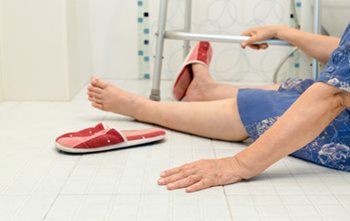
Caring for People with Fall Risks
Health care providers can help reduce patient's chances of falling and of suffering serious injuries like hip fractures and traumatic brain damage. Every day, in nursing homes located throughout the United States, hundreds of residents will experience one or more falls. Prevention of falls, whether causing injury or not, is a key safety issue in health care settings.
The interest in fall prevention has flourished and, as a result, our thinking about falls has dramatically changed. We now have a better understanding of why falls occur and, more importantly, what can be done to prevent falls from happening. As health care providers, we have a responsibility to promote the safety of our patients, residents, or clients. This means learning how to care for people that carry an increased risk of falls.
Questions? Check out our FAQs page and How Online IV Certification Works!
Objectives
Upon completion of the course, the participant should be able to:
- Identify confusion disorders.
- Recognize and identify signs of fall risk.
- List hazards of fall risks.
- Identify safety tips for fall prevention.
Curriculum
Chapter 1: Introduction
Chapter 2: Managing Residents with Confusion Disorders
- Residents with Confusion Disorders
Chapter 3: Residents Who Wander
- Residents who Wander
Chapter 4: Fall Risks Associated with Incontinence
- Residents with Incontinence
Chapter 5: Fall Risks Associated with the Hypotensive Resident
- Hypotensive Residents
Chapter 6: Fall Risks Associated with the Neurological and Musculoskeletal Disorder Resident
- Residents with Neurological and Musculoskeletal Disorders
Chapter 7: Fall Risks Associated with the Diabetic Resident
- Residents with Diabetes
Chapter 8: Conclusion
Chapter 9: Reference Support
- California Bill 241
- Implicit Bias in Healthcare
- What is Implicit Bias?
- Implications of Implicit Bias in Healthcare
- How to Reduce Implicit Bias
Price: $12.00
Contact Hour: 1

Course Author

Rein Tideiksaar
Rein Tideiksaar, PhD, PA-C, or Dr. Rein as he is commonly referred to, is the president of Fall Prevent, LLC, Blackwood, New Jersey, a consulting company that provides educational, legal, and marketing services related to fall prevention in the elderly.
Dr. Tideiksaar is a gerontologist, which is a health care professional who specializes in working with elderly patients, and a geriatric physician's assistant. He has been active in the area of fall prevention for over thirty years.
Course Accreditation
See our Accreditation Statements page to view our accreditation information.